JACKSON, Miss.—On Monday evening, New Hope Baptist Church’s sanctuary resembled a Sunday morning church service, but instead of gathering to hear scripture, citizens from across the capital city gathered for a town hall meeting on the Jackson water crisis. More than 100 people attended the meeting to discuss the NAACP’s Title VI Complaint against the State of Mississippi and how it disseminated federal funding from the American Rescue Plan Act and the Bipartisan Infrastructure Law.
NAACP President Derrick Johnson said the national organization filed the Title VI complaint against the State of the Mississippi for discriminatory practices against the City of Jackson. The goal of the complaint, he said, is to elevate the conversation and target the entity he says has caused the harm: the state government.
“What I’m saying is what happened in August was predictable,” Johnson told the crowd. “It was an intentionality by the state to starve the city of resources over a matter of decades. It is not a new occurrence. In fact, many of you participated in helping elect Harvey Johnson in 1997, and that’s when we began to see an acceleration by the state to starve the city of resources.”
Harvey Johnson Jr. was Jackson’s first Black mayor. Johnson has long been critical of attempts to lay the blame for the capital city’s water woes at the feet of its more recent Black leadership—after the change from white administrations starting with his election. In 2021, Lt. Gov. Delbert Hosemann highlighted Johnson’s immediate predecessor Kane Ditto as the last leader who meaningfully invested in Jackson’s water system.
“You remember during Kane Ditto’s administration; he did repair work on water and sewer,” Hosemann told the Mississippi Free Press at the Stennis Capitol Press Forum. “So what happened since then?”
Johnson pushed back on Hosemann’s characterization to the Mississippi Free Press. “During my administration we spent over $200 million on water- and sewer-infrastructure improvements over 12 years,” Johnson said later that day. “I don’t know what the impetus is behind all of this misinformation. I hope it’s not demographics.”
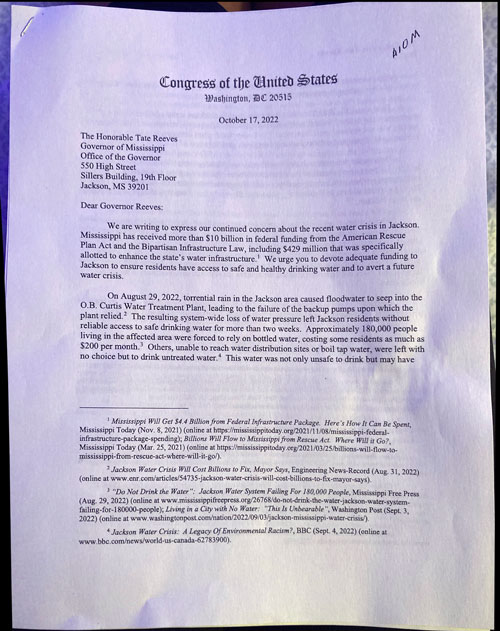
Mayor Johnson and other city leadership have also pointed to the 1% Sales Tax Commission as evidence of the state’s paternalistic attitude toward its capital city. While the sales tax is a voter-approved measure to grow Jackson’s infrastructure funds, the State of Mississippi allows the City of Jackson to appoint only a minority of its commissioners. Statewide leadership and the Chamber of Commerce appoints the majority who decide how Jackson can spend its own taxpayers’ money.
Derrick Johnson said the city’s requests are simple: that it wants clean drinkable water for all citizens and for the water system to remain a public asset and in local control.
“There may be people in the room who are seeking to privatize part of the asset or some of the asset,” Johnson said. “That’s not acceptable because everywhere you go where they privatize the asset, profit supersedes people.”
The NAACP CEO, a Mississippian who previously led the state’s NAACP from Jackson, explained that the water plant is a revenue generator for the capital city when it is working properly. In some cases, he said, a water plant can generate more revenue than a city receives from other areas and is perhaps the most valuable asset a city owns.
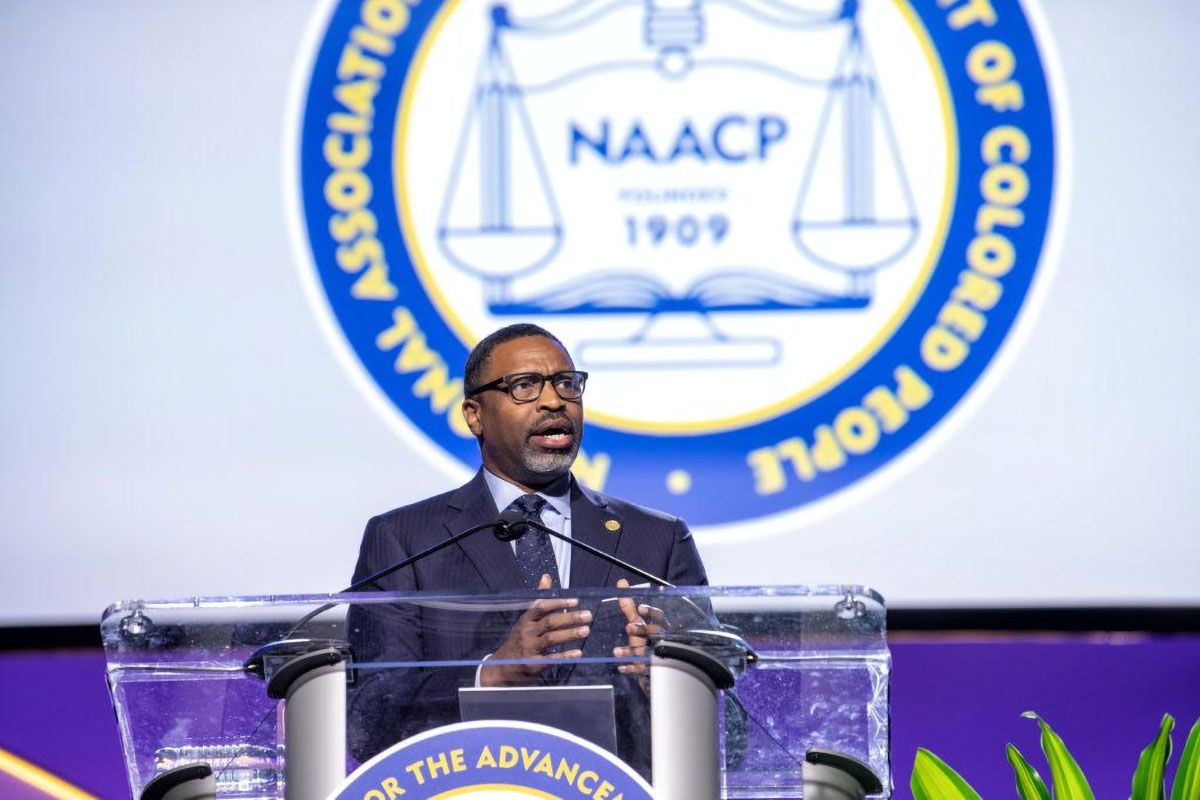
“When I’m talking about, ‘We don’t have time for us-versus-us fighting,’ we cannot allow individuals—whether they’re elected officials or not—come to sell us snake oil as if it’s the solution,” Johnson continued.
“A solution is applying the federal funds where the federal funds should have been applied in a more equitable way,” he continued. “Out of 25 years’ (worth) of clean-water federal funds (that have) come to the state, the City of Jackson has only received federal funds three years out of 25 years.”
On Oct. 17, 2022, Congressman Bennie L. Thompson, who also attended the town hall, wrote a letter to Gov. Tate Reeves to express congressional concern about Jackson’s water crisis. The letter urged the governor to devote adequate funding to ensure Jackson residents have access to healthy drinking water. That funding should include $10 billion from the American Rescue Plan and Bipartisan Infrastructure Law, including $429 million specifically allocated to enhance the state’s water infrastructure, the letter noted.
Thompson, for his part, has repeatedly criticized both the City of Jackson and the State of Mississippi for their role in the recent Jackson water crisis. Most recently, Thompson has challenged statewide leadership for their condescending attitude toward Jackson.
“Our state officials feel that they know what’s best for local government,” Thompson said on Aug. 31, 2022. “What we have is a reluctant office of the governor who’s decided that for whatever reason, Jackson (will) be treated differently.”
‘Extra Hurdle’
NAACP Director of Environmental and Climate Justice Abre’ Conner explained at New Hope that the reason the City of Jackson filed a complaint with the EPA is because Administrator Michael Regan has publicly stated the importance of prioritizing historically disadvantaged communities. and they want to hold him to his promise.
“You can have a Title VI complaint based on different protected categories, so that can be race, national origin, color, ethnicity, nationality, gender. … And in this situation, we said that because Jackson is a Black city, and because of how federal spending has happened across Mississippi, that that allows for us to file this title complaint,” Conner said.
Conner went on to explain that if any entity receives federal funds, they cannot legally discriminate based on those protected categories. If they do so anyway, the federal government can withhold the funds that entity had been accepting. In this case, that entity would be the State of Mississippi or the agencies within the state.
On top of receiving federal funds only three out of the last 25 years, Jackson has faced a number of other hurdles in pursuit of funding, Conner said.
“For example, the American Rescue Plan funding: Jackson is the only city in the entire state that has to go through two separate approval processes in order to get the projects funded,” she said. “It has to go through the (Mississippi) Department of Finance and Administration, (and) it also has to go through the Department of Environment of Quality.”
“So that in of itself is the problem. Why is it that no other city across the state has to do that?” she continued. “And it came after Jackson had requested funding. It was put in at the last minute, and now Jackson has this extra hurdle that it has to go through.”
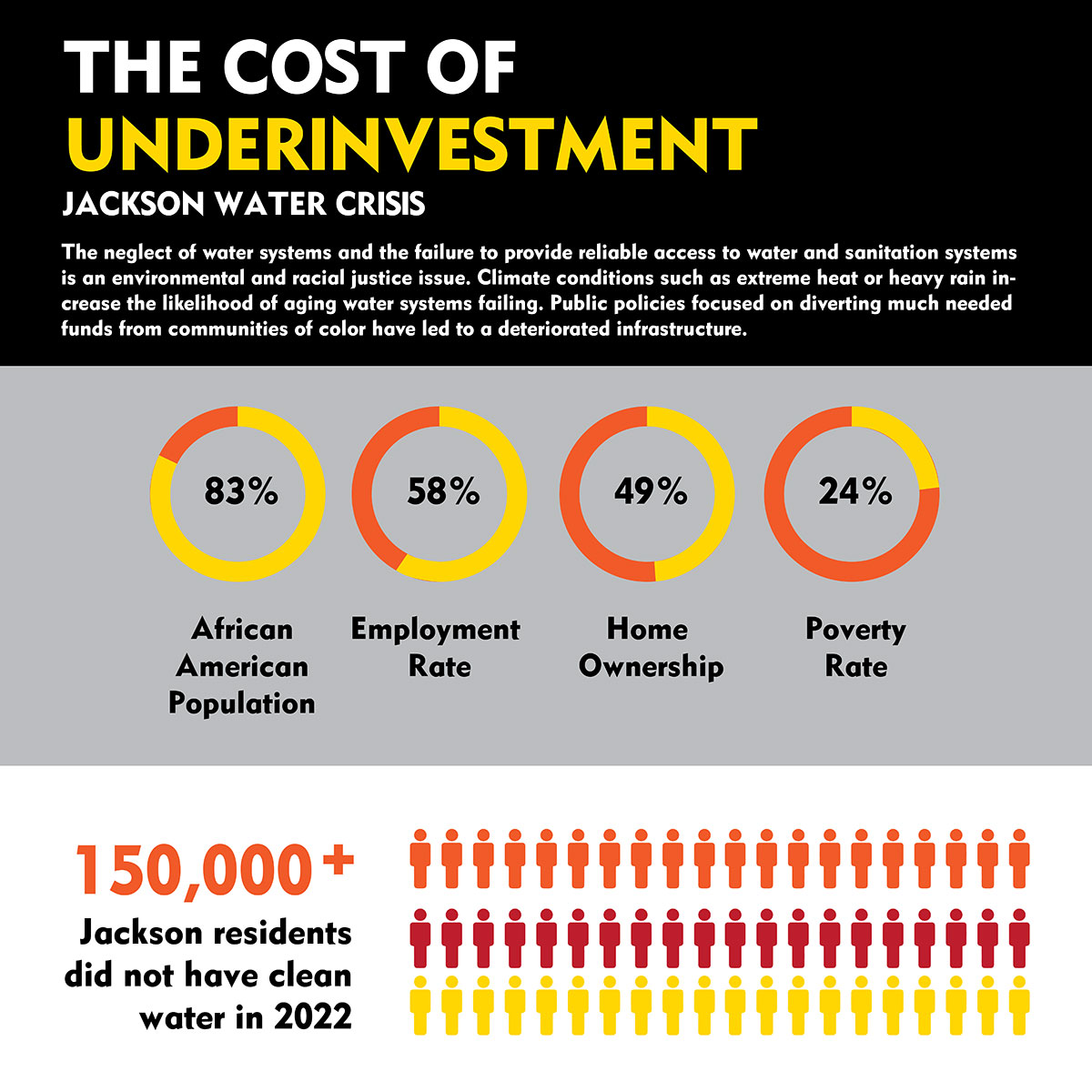
The State has the ability to ask the EPA for funding regarding water issues through an Intended Use Plan, wherein it maps out how it would like to ensure water funding is allocated across the state. When the State first sent its intended-use plan in, a Mississippi city had to have fewer than 4,000 people living in it to qualify for the water assistance.
“So guess who is not going to qualify for water-infrastructure funding: Jackson. And then, even though the State revised their intended-use plan for the EPA, they kept the amount of money that you could have forgiveness on a loan at $500,000,” Conner said.
The Florida resident noted that Mayor Chokwe A. Lumumba had been asking Gov. Tate Reeves for funding for infrastructure issues for a number of years, but the governor ignored his requests. Going further back, Mayor Johnson also asked for funding, but the State was reluctant to give any funding to Jackson, its state capital.
“The state got merely $75 million just for water issues, and that money was not actually going down to Jackson,” she stated.
In 2010, the Jackson Free Press reported that Tate Reeves even used the State’s blocks against Jackson water funding under Gov. Haley Barbour as a political talking point, which the Associated Press re-reported recently.
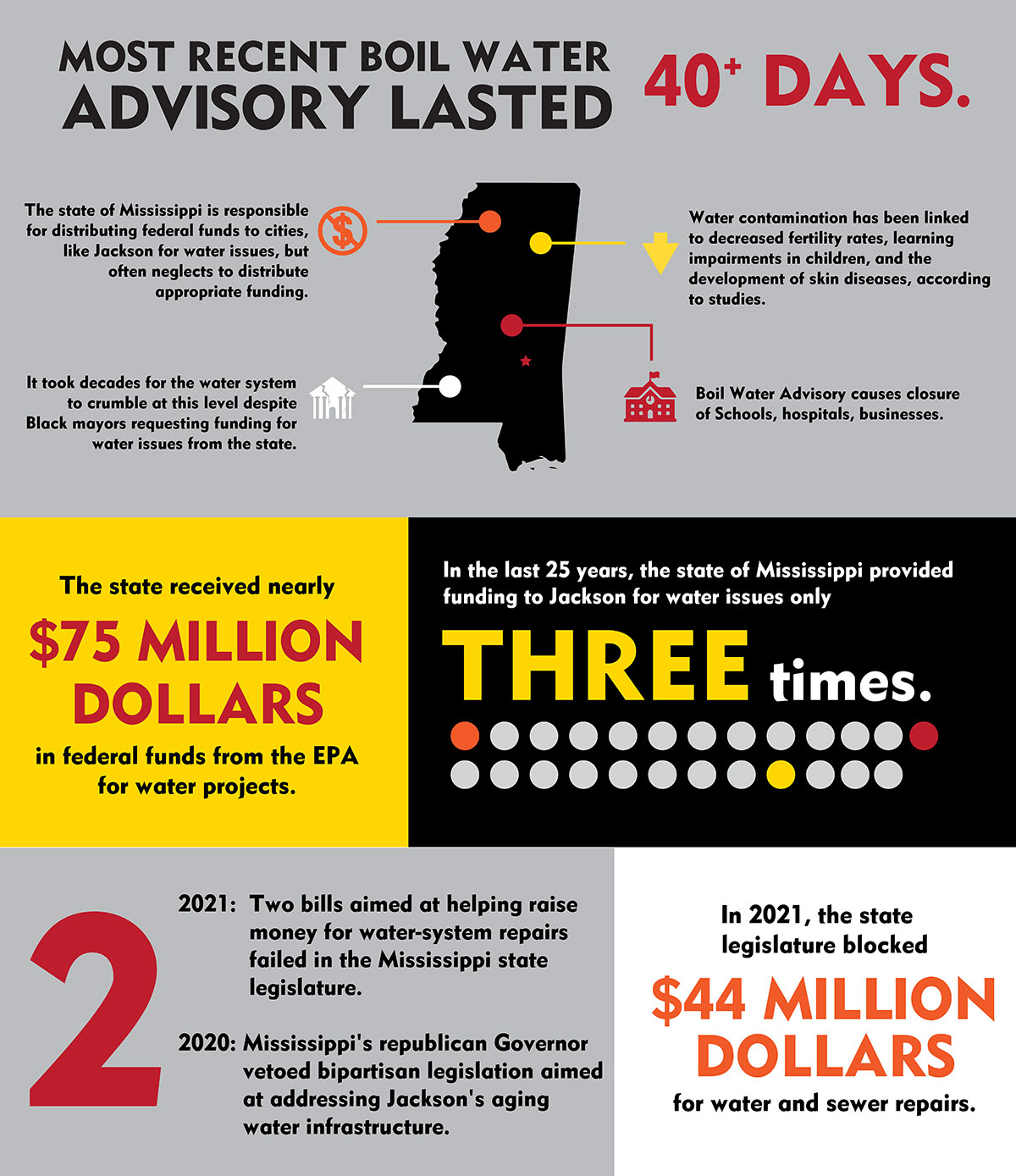
The EPA opened the investigation a few days ago and has given the State 30 days to respond. If the State responds back in a way that would allow for the investigation to continue the process, the EPA—along with the NAACP and community members—will create an investigative plan, the panelists told the New Hope audience.
“What we think is really important in this investigative plan is for us to really ensure that the EPA understands that we want the community to be involved in the findings (and) in the understanding of what the solutions need to look like,” Conner added.
Jacksonians can go to the NAACP’s landing page to sign a petition to ensure the EPA understands that the community needs to be a part of the next steps. Signing the petition will also ensure everyone stays up-to-date on what’s happening with the investigation.
“I know that many of you all that I spoke with said that you’ve been drinking bottled water your entire life, and that’s unacceptable,” Conner said. “It’s not fair. It shouldn’t be the case. And even though it may have been normalized, it shouldn’t be.”
‘The State Knew’
National Team Water Collective Founder Syrah Scott hand was one of the first raised to ask questions after the panel’s detailed discussion about the complaint. Her foundation has been helping with the nation’s water crisis in cities such as Flint, Mich., and Newark, N.J. It has partnered with Life Beyond Water to do a tap-water-testing campaign, including for lead.
“We found that basically when you test your water, you have so much that you can leverage off of. If folks don’t know what’s in their water, then really you don’t have a case,” Scott said. “So far, we’ve tested about 10 locations—homes and businesses—across Jackson. We’d love to be able to do this across the city. How can we collectively do that?”
Scott’s question was never answered or addressed. Other citizens took the microphone to give testimonies about the health issues they believe they have suffered due to years of drinking unsafe tap water.

After drinking Jackson tap water, Dr. Berthrone Mock-Muhammad with HeartPLUS Diagnostic Clinic described the taste as a mix of “oil and deep chemicals.” He thought he had filtered water, but he found that his filter was broken.
“I want to speak to the fact that this water crisis has caused issues where we’ve lost kidney patients because the filters were damaged as a result of the water that ran through them,” Mock-Muhammad said. “Water has to be filtered in a certain aspect and pH in order for it to properly dialyze water through a dialysis machine. Patients can’t take certain medications if the water’s not clean.”
The physician expressed concerns that in addition to lead, other particulates may be in the unfiltered tap water, like traces of medication that are running through the stream. Multiple lines of water run throughout the city, and not everyone has the same line, he said.
“I live in a pretty nice community. I found out that I had two lines of water running under my street,” Mock-Muhammad said. “The person told me not to say anything about it when I got my house, but I know that Eastover has a different waterline and a tank.”
The doctor suggested that a committee should form to examine the medical implications of what has occurred with the water as a step toward improving Jackson’s water situation. Scientists and engineers from Jackson State University and Mississippi State University should collaborate to find more sustainable solutions that do not rely on the old model of funding, he added.
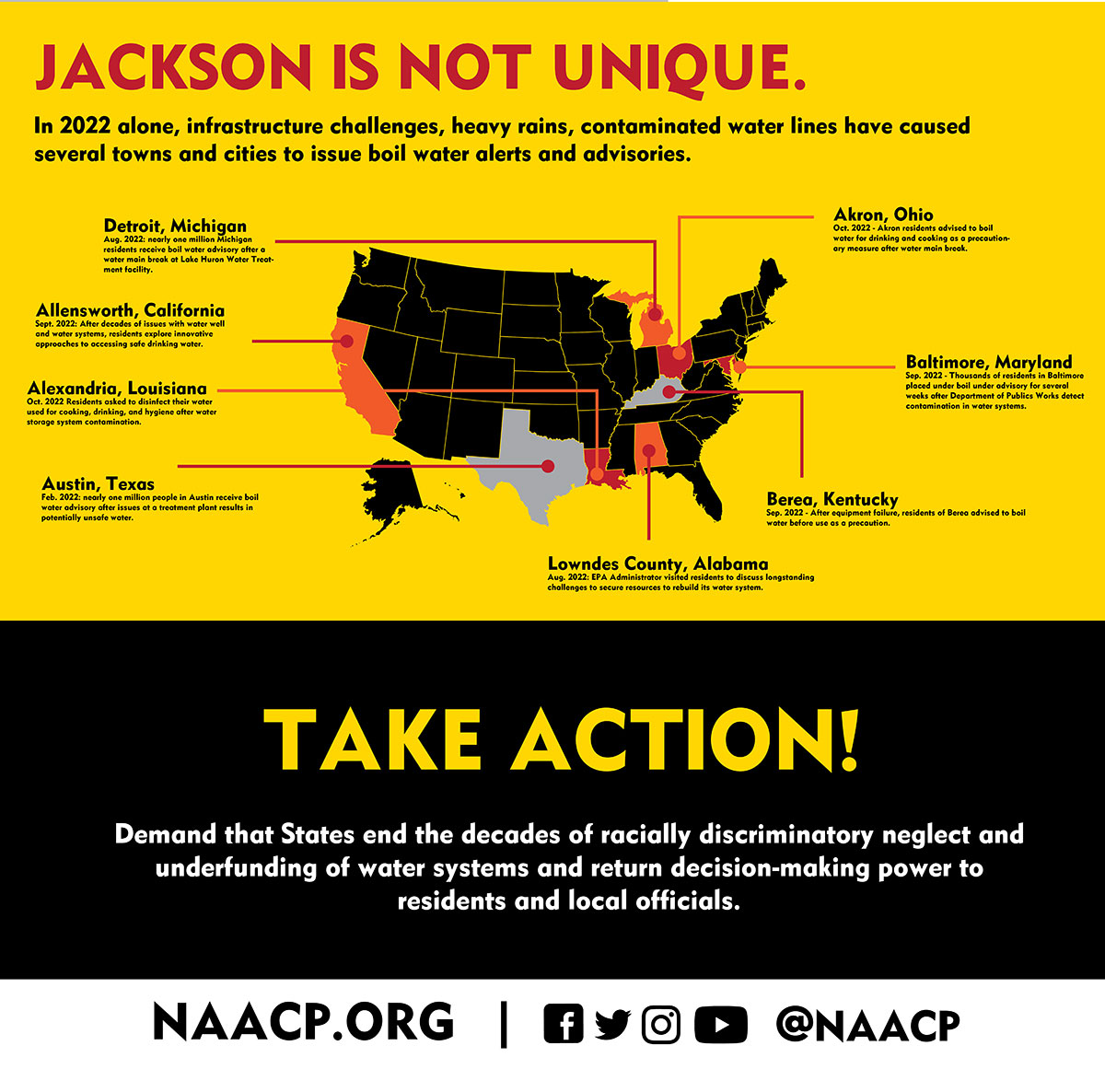
“How many of you all know that there was a student that created a straw that filtered lead water and went to Jackson State? … We need to travel to West Africa. They’re actually running water streams that use alternative means of filtering with solar energy,” Mock-Muhammad explained.
NAACP President Johnson told the audience that the State knew about Jackson’s water being contaminated, but did not do anything about it. Mayor Harvey Johnson had found the water to be contaminated in 2010, which is included in the complaint.
“The City of Jackson has had to issue close to 300 boiled-water notices over the last two years,” he said. “The state had noticed, and they didn’t do anything about it. So all of the contaminants in the water, we know. And what we’re saying is the state also knew and still starved the city of resources to address that public-health crisis.”
Johnson let it be known that the Environmental Protection Agency notified them last Thursday that the capital city’s filing has merit and that the agency will move forward with the investigation. In four months, the EPA will reach a decision on whether or not it finds evidence that the white-run State of Mississippi has discriminated against its majority-Black capital city.










